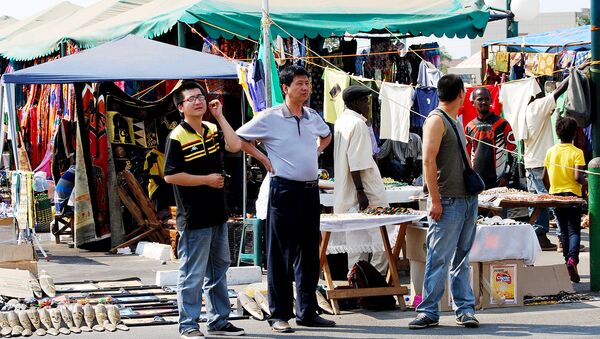Chinese unfairely targeted
The arrest and subsequent release of 31 Chinese nationals in Zambia over accusations of illegal mining this week highlighted the struggle Chinese immigrants face in Africa.
After spending 6 days in a Zambian jail, the group of Chinese, including five women with one of them being pregnant, finally boarded a plane back to China at the Ndola Airport in north Zambia on Tuesday afternoon. Instead of being deported, as suggested by earlier media reports, the group was allowed to leave the country legally, which gives them a chance to return to Zambia for work.
The arrest of Chinese nationals caused a diplomatic crisis between the two countries, with China lodging a protest with Zambian representatives in Beijing.
Zambian authorities arrested the group from seven private Chinese mining companies on June 1, after local mining company Konkola Copper Mines (KCM) reported to Zambian police that the Chinese companies were using copper ores stolen from their mines.
But Chinese immigrants living in the region said they were being unfairly targeted by Zambian authorities and one of the Chinese women arrested, who is pregnant, was just visiting her husband, who worked as an interpreter for one of the Chinese mining companies.
"I’m very disappointed with the government in Zambia. They arrested the Chinese nationals as part of their efforts to comfort the grievances from locals against Chinese. They chose to enforce the law selectively, specially targeting the Chinese companies in Chingola," Robin Yue, who works for a property development firm in Ndola, a city about 75 miles southeast of Chingola, said.
Social isolation
China established diplomatic relations with Zambia since the African country’s independence in 1964. China financed and built the 1860-kilometer (1155-mile) TAZARA railway linking Tanzania’s largest city and port Dar es Salaam with Kapiri Mposhi in Zambia’s Central Province between 1970 and 1975.
As China looks to Africa to feed its demand for natural resources to support its rapidly growing economy, Zambia, Africa’s second, and the world’s seventh, largest copper producer, became a major target of Chinese investment in the last two decades. The state-owned China Non-Ferrous Metal Mining Group Company (CNMC) has been exploring Chambishi copper mine in Zambia’s Copperbelt since the late 1990s. In 2007, CNMC built the Zambia–China Economic and Trade Cooperation Zone (ZCCZ) in Chambishi and east Lusaka, which is the first Chinese-built multi-facility economic and trade co-operation zone in Africa.
Following state sponsored investments into Zambia, private Chinese entrepreneurs also started to look for business opportunities in the resource-rich nation as economic growth slowed at home. According to official figures, about 600 Chinese companies have invested in Zambia, most of them private businesses. The boom of Chinese-run businesses in Zambia also brought a new wave of Chinese immigrants into the country.
Yue, 29, arrived in Zambia about three years ago when his company sent him to the country for a mining-related project. After making contacts with local Chinese businesses, he decided to return to the country, over 6000 miles away from his hometown of Shaoyang in central China’s Hunan province.
"The salary is about 50 percent more than what I can make in Beijing. And the company takes care of my accommodation and food here, which allows me to save some money. Plus, the air quality is much better here," Yue said.
As many young Chinese graduates looking for a better future, Yue first moved to Beijing after graduating from Central South University in Changsha, Hunan province. When an opportunity to work in Zambia came up, Yue, who had never left China before, wanted to take advantage of his English skills and see what life is like overseas.
Unlike many of his Chinese colleagues who took their spouses to Zambia, Yue’s girlfriend decided to stay in their hometown to work as a civil servant, a position in the Chinese government which is viewed as a stable career option. The couple got married earlier this year, when Yue returned to China for a vacation during the Chinese New Year.
In addition to the time difference and being thousands of miles away from his newly-wedded wife, Yue found it very difficult to integrate into the local community. In spite of speaking fluent English and working with five Zambian employees in his office, Yue rarely communicates with his Zambian coworkers outside of office business. He also felt that locals in Zambia work at a different pace from Chinese.
"In China, everyone is focused on making more money and trying to figure out what to do next. Here, people are more relaxed. They don't care about working so much," Yue said.
Struggling to make new local friends and start a social life in Zambia, Yue said he goes to bed before nine in the evening and wakes up at five in the morning for a daily run.
The news of the arrest of Chinese nationals in a nearby city made Yue change his opinion on the social position Chinese people hold in Zambia.
"Before, I thought when China gets stronger, Chinese people will be treated better. But now I realized that this is not the case. No matter how much contribution we make and how many jobs we create, Chinese people are still a weak group in Zambia," he said.
The company Yue works for runs a 25,000-square-meter wholesale market in Ndola, which was completed in December 2015 at a cost of $35 million.
Keep an open mind
"China takes our primary goods and sells us manufactured ones. This was also the essence of colonialism," Lamido Sanusi, the former governor of the Central Bank of Nigeria, wrote in an op-ed in the Financial Times in 2013.
Harsh rhetoric against Chinese mining firms, alleging slave-like labor conditions and lackluster safety standards in Chinese-run mines, helped former Zambian President Michael Sata win the presidential election in 2011, although he toned down his stance against Chinese firms after taking office.
Human Rights Watch, a New York based advocacy group on human rights and labor conditions globally, released two lengthy reports in 2011 and 2013, accusing mines run by the CNMC of serious labor rights abuses such as 12-hour shifts, despite the hazardous nature of the work.
But private Chinese entrepreneurs and new Chinese immigrants who work for those private companies like Yue are as vulnerable as the Zambian workers in the CNMC mines.
Following the arrest of Chinese nationals this week, Yue said he was not sure whether he wants to continue to work in Zambia after his two-year contract finishes.
However, while the anti-Chinese sentiment persisted, researchers said local residents in Zambia continued to have an open mind towards Chinese.
"The locals in Zambia are very curious about Chinese. They’re very open minded and are willing to understand the Chinese better," Dr. Di Wu, a lecturer at SOAS University of London who did his PhD project on everyday life of Chinese migrants in Zambia, said.
According to Wu, the Zambian government is good at following the country’s laws and usually does not make arrests for no reason. He suggested Chinese businesses get familiar with local laws and find a way to negotiate with local authorities with help from the Chinese embassy in Zambia.
Based on his research, Wu said a big problem for many new Chinese immigrants is still the language barrier, as many Chinese who arrive in Zambia do not speak much English and only a small portion of better educated locals can speak English fluently.
Wu suggested that the projected length of stay for new Chinese immigrants also plays an important role in their social integration.
"Cultivating new relationships needs time. For Chinese who come under two-year work contracts, it’s definitely difficult for them. The ones who plan to stay longer will be more willing to adapt to the new environment," Wu said.
Wu added that the rise of inter-nation marriages in recent years between Chinese and Zambians is a sign that the situation for Chinese immigrants is improving.








